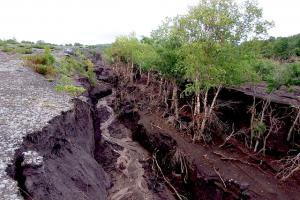Engineering Geology & Seismology

Introduction to Engineering Geology
Introduction to Engineering Seismology
Geology used in Civil Engineering
- Stability of rock and soil: Land slides
- Geological investigation in engineering construction: Tunnels, dams and bridges
- Engineering Seismology
Importance of seismology in civil engineering practice
- Continental drift, plate tectonic and elastic rebound theory
- Types of Seismic waves
- Earthquakes: Causes and effects
Intensity and magnitude scale - Engineering Seismology
- Earthquake observation: Seismograph and accelerograph
- Characteristics of strong motion: amplitude, duration and frequency
- Seismic hazard
- Local site effects
- Seismic risk: Vulnerability, exposure and hazard
What is engineering geology?
Seismology is study of the generation, propagation and recording of the elastic waves and the source that produce them.
Engineering geology is the application of geological data, techniques and principles to the study of rock and soil surfacing materials, and ground water. This is essential for the proper location, planning, design, construction, operation and maintenance of engineering structures.
Recommended Books
Earthquakes by Bruce A. Bolt
Geology: General and Engineering by K.M. Bangar
Importance of engg geology in Civil Engineering practice
What does Engineering Geology study?
Rock, soil, water and the interaction among these constituents, as well as with engineering materials and structures.
Why to study Engineering geology?
Serve civil engineering to provide information in 3 most important areas:
- Resources for construction; aggregates, fills and borrows.
- Finding stable foundations
- Mitigation of geological hazards; Identify problems, evaluate the costs, provide information to mitigate the problem
Keywords: geological engineering, engineering geologists, engineering geology course, introduction to seismology







